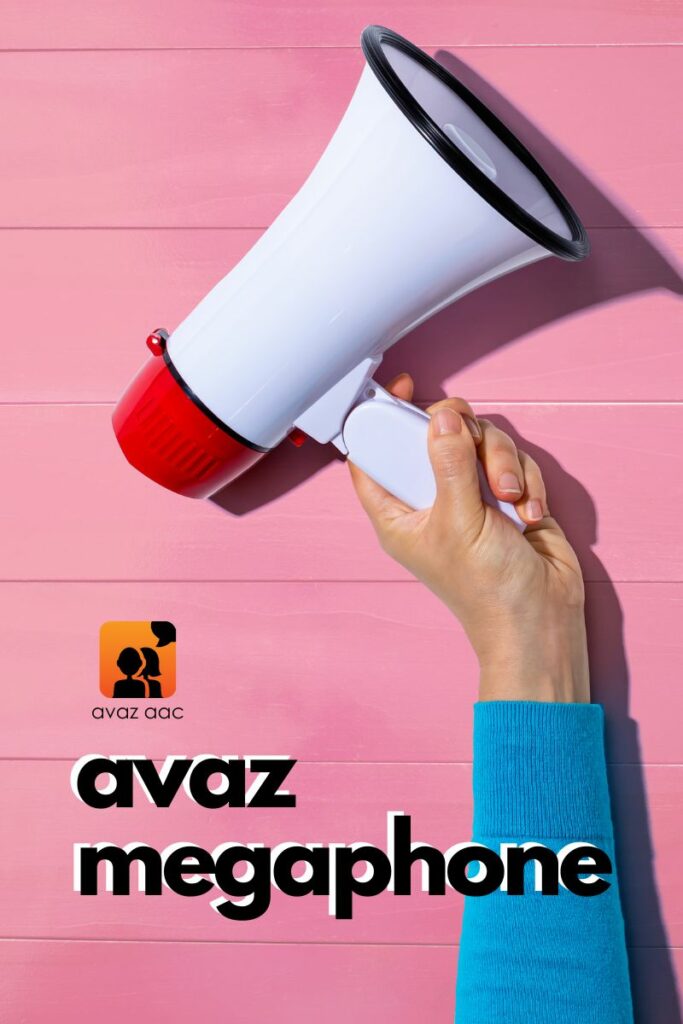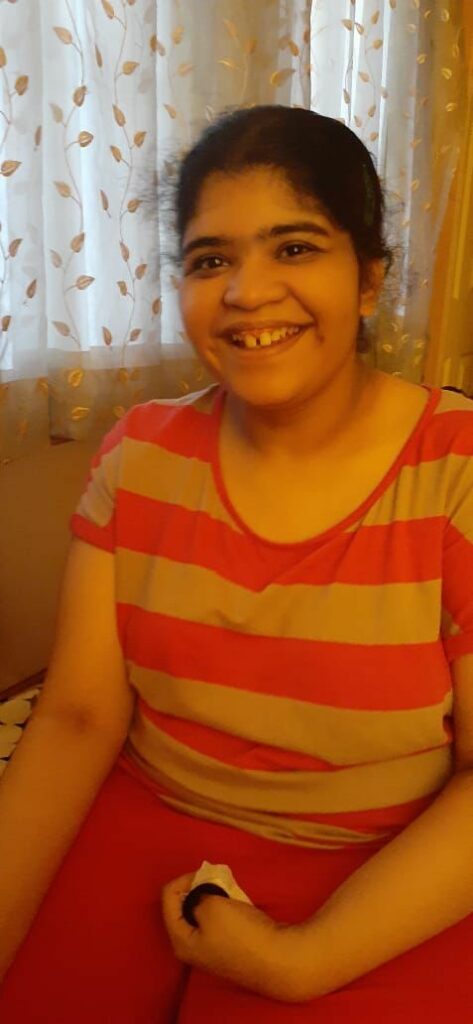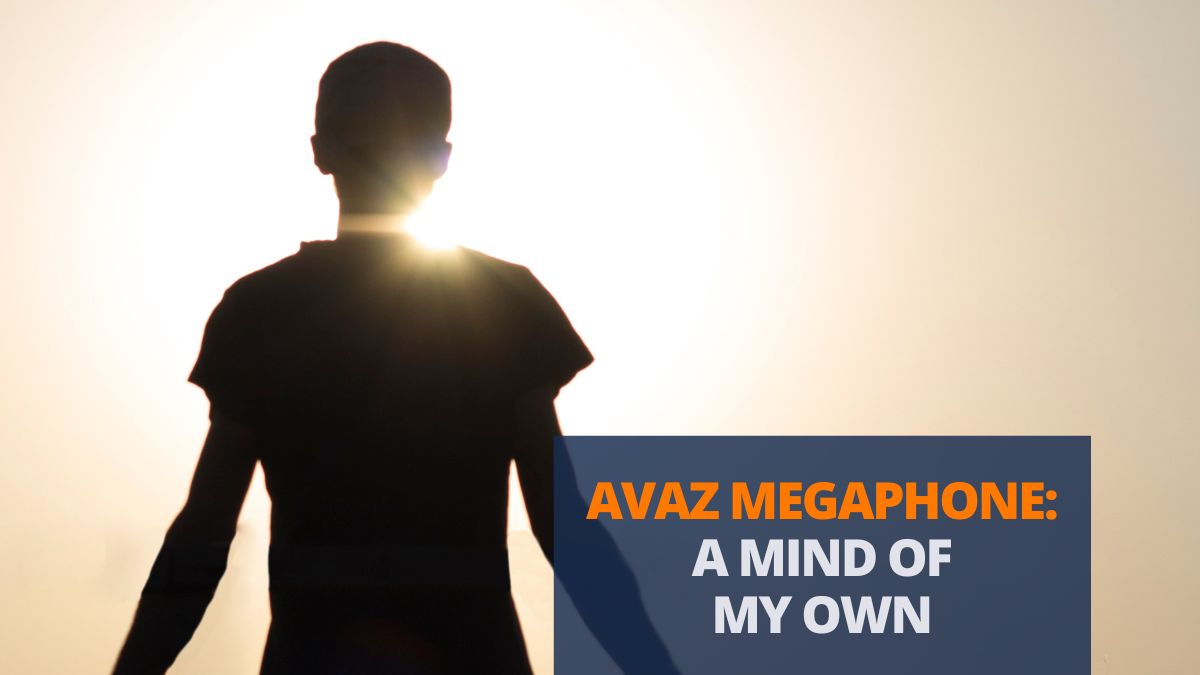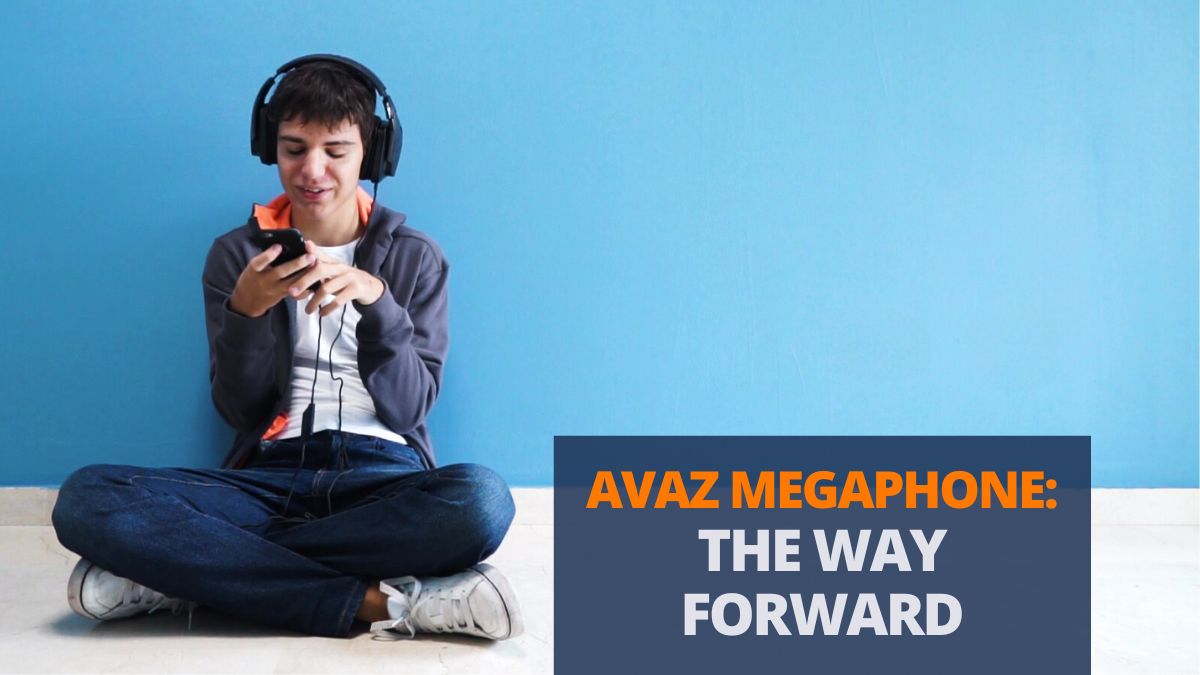We live in a society that places great importance on verbal speech, rather than communication. With this kind of pressure, parents of children with speech delay leave no stone unturned to get their children to speak. Often times they may even try things that may make their children uncomfortable.
What does a child think of these measures? How does it affect them and the way they relate to the world? Aditi examines these dynamics and more in this delightfully sweet(!) and astute short story.
This is an Avaz Megaphone feature.


Thirteen!
She was a girl with a plan. After all, she was turning thirteen in a week. This was huge! A big day meant having big plans. And she sure had a big one up her sleeve – something that she had been wanting to do since she was eight!
Meet Sahana. A regular girl next door, but with one tiny difference. She was a non speaking autistic.
Sahana recalled her early childhood as being very different from those of her peers in the apartment and school. For one, no matter how hard she tried, she could not get words out of her mouth. The inability to express had only contributed to the existing chaos of everyday life.
What everyday chaos, you ask? Was she the only one who perceived the world around to be extremely noisy and most dresses itchy and pokey? Why did the comb, an innocuous looking thing, feel like a scalp slasher? The list was a long one – long enough to make a good day seem like an attempt to scale the Everest! They had a name for it too – Autism.
Sure enough, she was packed off to a whole bunch of therapies after she was diagnosed. All of which were ‘designed’ to help her achieve the skills necessary to ‘lead a normal life’.
Hating Speech Therapy
A few of them had helped, but a bunch of others were torture in plain sight. Topping that list was speech therapy.
The speech therapist sincerely believed that Sahana was not making an attempt to talk. Every time Sahana gestured or pointed to something, the therapist would insist upon her verbalizing it. She even encouraged Sahana’s parents to follow the same ‘strategy’ at home. What nobody realized was that Sahana was unable to make speech sounds. She wasn’t holding back on purpose! And this new ‘strategy’ had just made her life akin to running a marathon on the daily!
Soon, Sahana gave up on attempts to initiate communication. She had come to the conclusion that doing so would only come back to bite her. In the form of expectation to verbally express it all.
The Speech Diet
This made Sahana’s parents worry. Had Sahana’s skills begun regressing? Sahana’s mother had heard about this whole regression deal in the parent support groups that she was a part of.
She had even heard of diets that some parents had put their children on. The diet that grabbed the attention of Sahana’s mother was the supposed improvement in the ability to speak.
Sahana was eight years old when her tryst with the diet began. She vividly remembered the first morning of getting on the diet. It was a rather foggy December morning when her mother gave her a glass of cold tender coconut water instead of the steaming mug of her favorite chocolate milk. It felt like someone had detached her mouth and thrust it into the freezer!
Sahana decided to co-operate. Contrary to her therapist’s belief, Sahana was desperate to find a way to express herself. And if the diet helped in some way, then so be it. Her mother was determined to make it work. And when she was determined, she always went the whole nine yards.
Gone were Sahana’s favourite parathas, dahi and even paneer. Gulab jamun, jalebis, cake, chocolate and all kinds of sweets soon became history. The list of forbidden foods was a long and elaborate one. This also meant that Sahana’s birthdays were celebrated with vegan, sugar-free and gluten-free cakes made of millet flour. Not that it tasted bad, really. But was it wrong to crave for the real deal every now and then? Or just ONE day in a year?


Four years later, this diet was still part of Sahana’s life. Speech, on the other hand, continued to elude her as effectively as ever before.
An AAC Kind Of Change
A breakthrough in Sahana’s life came a year ago when her parents finally agreed to her new therapist’s suggestion to introduce her to Avaz, a text to speech app on the iPad.
Sahana’s parents earnestly believed that introducing her to such an app would take away the initiative to attempt to talk. Her old therapist and a bunch of other parents on their support group believed so too. It took a lot of convincing to get her parents to get the app for her. This was something that Sahana was eternally grateful to the therapist for.
In a few months time, Sahana developed the skill to type and express her thoughts. For the first time in twelve years, Sahana felt understood. She felt free!
Sahana’s parents, though, did not stop chasing the elusive speech. ‘Each to their own’, she had told herself when her parents had qualified their joy in being able to finally understand their daughter with the expectation that it would soon come in the form of speech. Sahana had finally found her voice and she intended to use it well enough.
A Birthday Wish
“What do you want for your birthday, Sahana?”, her father asked. “You are turning thirteen and it is a big day!”
Sahana picked up her iPad and loaded Avaz. She told herself that it was time to speak up. “I want a real cake papa, not the one I get every year”, typed Sahana.
“But the diet is for your sake Sahana, for you to be able to talk”, said Sahana’s mother.
“Is one day going to make a big difference? Besides, I am talking with Avaz and asking for what I want!’, typed Sahana.
Speaking My Mind, FINALLY!
“That’s okay”, said her mother, unwilling to be convinced. “I am talking about being able to speak, like the rest of us”, she continued.
“Here she goes again!” thought Sahana. But today, she was knew she would have to speak her mind.
“If I could do it mamma, don’t you think I would have already done it in all these years?”, typed Sahana. “All I am asking for is a cake for my big day. I am a teenager today! Please don’t deny me that, just because you expect things to be a only certain way!”
Sahana exhaled with relief. That surely felt good. She did not know if she would ever get the real deal, even if it was for just one day. But she had made her point. She had been heard!
What better gift could she ask for her birthday?!
Avaz Megaphone is a platform for neurodivergent individuals to express themselves through the written word. We accept opinion pieces, short stories and poetry. Authors of accepted works will receive an honorarium. To make a submission please email us on: [email protected]
Avaz Megaphone is a platform for neurodivergent individuals to express themselves through the written word. We accept opinion pieces, short stories and poetry. Authors of accepted works will receive an honorarium. To make a submission please email us on: [email protected]
WRITTEN BY
Aditi Sowmyanarayan
Student & Writer
Aditi Sowmyanarayan is an eighteen year old who uses Avaz, a text to speech app, to communicate. She goes to Ishanya India Foundation, a special school in Bengaluru. Aditi is an avid blogger and an aspiring writer. She blogs on www.smallstepbigthought.blogspot.com
She can be reached on Instagram at writeaditi and on her Facebook page : small step big thought






Loved to read the story Aditi. Three cheers for Sahana for making her point! Being given the elective choice to use whatever mode we seek to communicate in, makes all the difference.
Yes absolutely 👍
you nailed it Aditi!!
Thank you
An informative post, with a brilllliantly refreshing take! Kudos Aditi!! Keep shining!
Thank you! I am glad I was able to get across the sense of empowerment that having a voice gives:)
An excellent piece of communication, Aditi, in the form of a short story. Goes to confirm the fact that, lucid communication, in any form, is as important as, meaningful speech. Hence, where speech is not possible, any form of communication is good enough and as effective.
Thank you Thatha. Communication is key to recognising the autonomy of us autistics and by communication I mean communicating in a way that is sensory friendly and most effective. Glad I was able to get that message across
Great work and Great to know that it’s possible .. My daughters name is also Sahana…. I wish I could also make her learn the app.. how can I do that??
Hello Janani,
Thank you for reaching out and expressing your interest in Avaz. We are thrilled to hear about your enthusiasm to help your daughter Sahana learn and benefit from the app. Our team will be reaching out to you shortly to provide you with further guidance on how to get started with Avaz and support Sahana’s learning journey.
– Team Avaz
Thank you very much for your kind and enlightening feedback, Aditi.